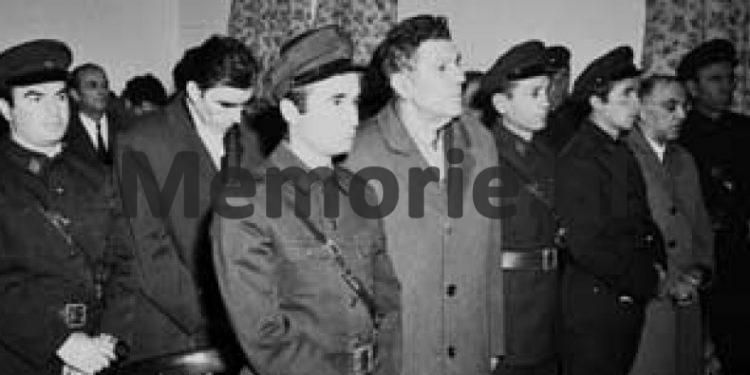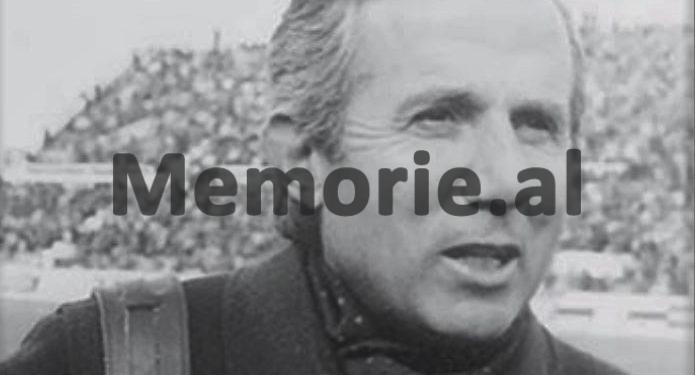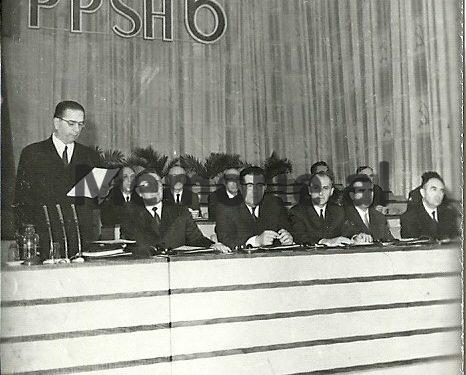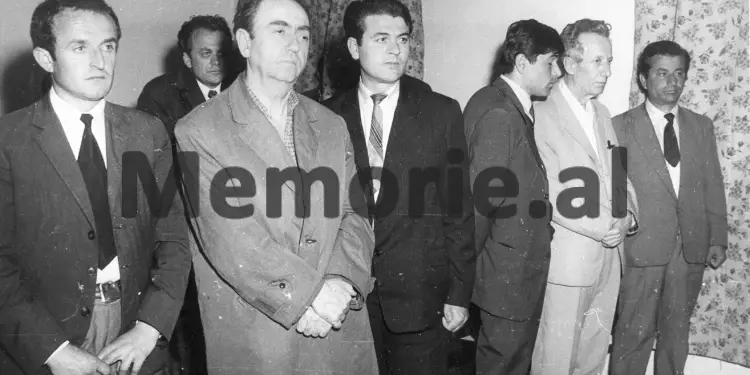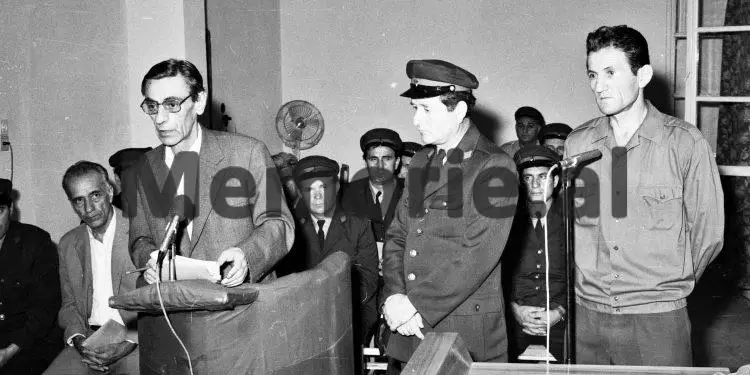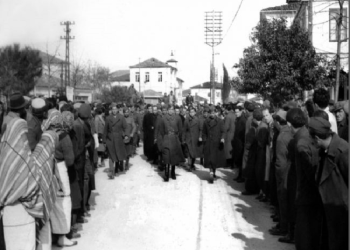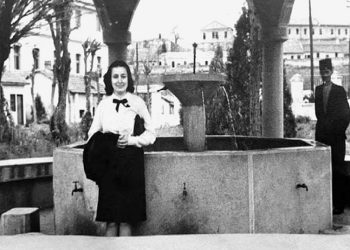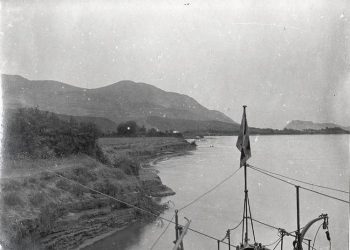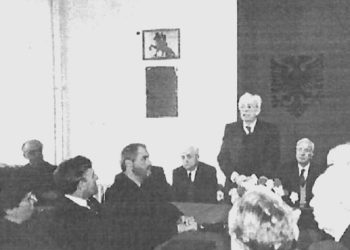From Skifter Këllici
The ninth part
Memorie.al / It is the fourth time that I am writing about the 11th National Song Festival on Albanian Radio Television, (December 22-25, 1972), as much as I wrote some time ago about the Tirana Conference, (16- April 20, 1956). And this time for the same reason: for the lack of historical accuracy of some events related to this festival, which Ramiz Alia, the former first secretary of PPSh, after the death of Enver Hoxha, describes in the book his last “My Life” (2010), although there are objective, honest statements in it, especially when he testifies about the serious mistakes that led to the failure of the communist system in Albania, led by Enver Hoxha, for which he apologizes. But in the description of his figure, Ramiz Alia is often contradictory, especially in the chapter; “The fight against liberalism”, where it stops at the 11th Song Festival on Albanian Radio and Television (December 22-25, 1972).
Continues from last issue
Terror on bureaucrats and high military…!
Less than a year later, the sling held by the Goliath, Enver Hoxha, turned into a sword, at the 5th Plenum of the Central Committee of the PPSh, which was held on July 25-28, 1974, when analyzed and convicted; “the hostile activity of Beqir Balluku, former Minister of Defense, as a sworn enemy of the party and the people, an agent in the service of the external enemies of the People’s Republic of Albania”, and a year later, in the 6th Plenum , which was held on December 16-17, which condemned; the “hostile activity” of the followers of Beqir Balluk, Petri Dumes, Hito Çakos, Rrahman Parllaku, Dilaver Poçi and many other major soldiers, always in the field of army purges.
This “sword”, then turned in the field of economy, “cutting off other heads” in the 7th Plenum (May 25-26, 1975), where members of the Political Bureau and ministers Abdyl Këllezi, Koço Theodhosi, etc., “for serious mistakes in the economic field”, were condemned as enemies of the Party. The apogee of this campaign of punishments and unprecedented purges, this turn to maintain his bloody power, this tyrant, reached in 1981-’82, when he eliminated by suicide, or murder, the Prime Minister, Mehmet Shehu and the Minister of Defense, Kadri Hazbiu , who, according to him, for years were preparing a big and dangerous conspiracy to overthrow the popular power, a conspiracy in which Todi Lubonja and Fadil Paçrami were also part (Enver Hoxha, Vepra, page 9, 1986).
Even the great French writer, Jules Verne, if he were alive, would have envied Enver Hoxha, for this lush fantasy, which concocted plots after plots, which were discovered with vigilance… by the Party, (that is, by himself and nobody else.). Ramiz Alia is right, when he writes in his book “My Life”, that he (Enveri) suffered: “From a certain paranoia, in my opinion justified”, (page 199), but in fact, not at all justified!
Who was Enver Hoxha?
In the chapter “Death of Enver Hoxha”, of the book “My Life”, among others, evaluating this Hitler-Stalinist dictator, Ramiz Alia writes as follows:
“Enver Hoxha enjoyed a special respect and love and that the broad popular masses had an unwavering faith in him…! People who, during 50 years, were used to seeing and hearing him on numerous occasions, in joys and sorrows, said that he was ‘immortal’! Enver Hoxha was a political personality…! For five decades he has been the main leader of Albania, respected and loved by the people… he was, in the true sense of the word, a statesman…”! (pages 314,315,316).
Without wanting to make the slightest controversy, to question or oppose these epithets that Ramiz Alia attributes to him, I am quoting only some definitions from the voice of ENVER HOXHA, in the Albanian Encyclopedic Dictionary, (edition of the Academy of Sciences of Albania, 2008), which was prepared and approved by academics, professors, doctors, eminent, i.e. personalities specialized in the study of the history of Albania, with either left or right leanings, who reach it the same conclusion: “Under the leadership of Enver Hoxha, a Stalinist dictatorship was established in Albania, a fierce class war was implemented, accompanied by violations of freedoms and human rights, with persecution and even capital punishment of political opponents…!
The activity of PPSh, which was led by Enver Hoxha, was characterized by continuous attacks on groups deemed hostile, a consequence of the class war, which extended to its ranks. Enver Hoxha opposed any attempt to change and liberalize the system…! During the years that he led the state, the economy in general, energy, education, culture, health, recognized high rates of development.
But the radical measures that were implemented in the economy led to the complete liquidation of private property, private initiative and the creation of a centralized economic system, which proved ineffective and ultimately failed, plunging the country into a general crisis. ….! In foreign policy, Enver Hoxha followed a harsh course, which led to the isolation of the country from the world”! (page 958 of the above work).
It seems that Ramiz Alia, when he wrote these lines, forgot, or did not know, what is written in this latest edition of the Academy of Sciences. But apparently, he also forgot that in the self-critical discussion he made in the Plenum of Berat, held in November 1944, Enver Hoxha expressed himself this way: “I got close to the Korça Group. Others thought I was his leader. I was sympathetic. When the Party was created, I was in the Central Committee; I entered with the proposal of Koço Tashko.
In the Country Conference, Miladin Popovici advanced me. The proposal for political secretary was made by Dushani and Liria. I expressed that I could not do this task and proposed Koçi. I have called the task of the Commissar of the General Staff undeserved. I did not know how to organize the army. It was difficult for the Party organs to function regularly during the war. I was afraid to call the meetings of the forums, because they required preparation, and I couldn’t do it”! (AQSH, Fund 14, File 2, November, 1944).
This is the real face of Enver Hoxha!
It seems again, that Ramiz Alia “forgets”, (this time it’s not that he doesn’t know), the terrible consequences that the Albanian people had during his despotic regime, which he inherited after his death, on April 15 of the year 1985, which he should have included in his book:
Shot: 5477 men and 450 women; Prisoners: 26,768, of which 998 men and women died;
Maddened by torture: 308 men and women; Interned in concentration camps; over 32,000 people, of which 7,022 men and women died, not to mention the hundreds of thousands of files on citizens, with compromising facts, the vast majority of whom were forced to become collaborators of the State Security, otherwise they would be sent to prison for 10-15 years, according to Article 55 of the Criminal Code, for agitation and propaganda and their families were exiled.
And this Security was directed by the Ministry of the Interior, which was covered, controlled and received instructions from Hysni Kapo, Enver Hoxha’s right hand in the Central Committee of the Party and from Mehmet Shehu, the Prime Minister, i.e. from Enver Hoxha himself and then from Ramiz Alia himself, who did not make the necessary efforts to delete once and for all, this article of the terrible Criminal Code of “democratic” Albania.
The above figures are published by the Institute of the Politically Persecuted, on the basis of documents stored in the archives of the Ministry of Internal Affairs during the years of the dictatorship. And, surprisingly, Ramiz Alia, not only did not take measures to release hundreds and hundreds of cultured prisoners, intellectuals and clerics, but he did not do this either for Fadil Paçram or his friend, Todi Lubonja, because; “…the big problems that had to do with the fate and future of the whole country…delayed me from helping my friend”. (page 266 of the book “Life…”).
The source of these terrible consequences, that is, of the deformations and unjustified actions in the name of class war, the restriction of individual freedoms and the isolation of the country, etc., – as he writes in the preface of this book, he explains as follows: ” Not infrequently, the organs of the dictatorship, especially those of the State Security, overstepped the powers assigned by law. Thus, as a result of various deformations, innocent people and even their families have suffered unjustly…”! (page 8, of the work “My Life”).
This statement is not entirely correct, if we only mention the consequences brought about by the 4th Plenum of the PPSh, which was deliberately triggered by the dictator Enver Hoxha, the 11th Song Festival on Albanian Radio-Television in 1972, which I analyzed in this dossier…! All the punishments, as we saw, were done on his initiative and only him, because he stood above State Security, above the Party, above the state, above the people, above Albania.
However, as it was underlined in the first part of this cycle, Ramiz Alia, underlines that; “looking back, without a doubt there is a reason to self-criticize and apologize to the people, for the suffering that was unfairly caused to some special people, as a result of the fierce development of the class war, or the violation of laws by of repressive bodies and other organisms of the party-state”, (ibid., page 9).
Again, late affirmation, but better late than never. Only with one big correction: Those who suffered were not a few specific people, but thousands and thousands, as it appears from the figures I mentioned above. Another very important thing: this apology that Ramiz Alia is asking the people, the dictator’s wife, Nexhmije Hoxha, has a duty to do, even as soon as possible, so she should also ask for forgiveness. Disconnecting once and for all from her love for her husband, from her memories as an exemplary father, as she rightly described him in all her articles, interviews, books, because that’s what he seems to have been in the family, finally have the courage to call Enver Hoxha, as; the source of many evils suffered by the Albanian people and Albania during the entire period of the dictatorship, which her close friend and collaborator, since her youth – Ramiz Alia, points out in his book “My Life”.
Not only that, but Nexhmija must finally admit universally that he was, as the old Romans say, his alter ego, i.e. “another me, that he and she were like Siamese brothers, that in every criminal act, Enve Hoxha was consulted first of all with her and only with her, whom our great writer, Ismail Kadare, called “Lady Macbeth”.
EPILOGUE
It’s been 60 years since the development of the 11th Song Festival in RTSh. Situated so far from the homeland, I remember this beautiful show, I remember what happened next, events that I have tried to describe in my novel, “The Eleventh Festival” and, simply, historically, in this cycle. I remember that night of the festival, when I went backstage to congratulate, like many others, the two presenters of the program, Edi Luarasi and Bujar Kapexhiu, the director, Mihal Luarasi, some of the singers I knew, including Justin Aliaj, the leader of to the small wind orchestra, Gaspë Çurçinë…!
And now it seems to me, as if I see a monster, that with a sword in his hand penetrates spitefully into this so happy environment. It is Enver Hoxha. He swings his sword mercilessly over the heads of the festivalgoers, then over the heads of those who have organized the festival itself. Then he goes out in a frenzy to cut heads, everywhere in Albania and, even… in the entire globe, as the verses of the song say: “Enver Hoxha sharpened his sword, / once more, oh, for the situation, / This it’s the sword that hangs over the head, / To all the enemies that the world has today…”!
It is strange how such a paranoid would like this song to be spread and sung everywhere as an anthem, when in its verses, he admits that he was nothing more than a sadistic tyrant, possessed by delusions of grandeur, who, in fact, he was ready to dispossess all his enemies wherever they were, that is, in the entire terrestrial globe!?
And, after ruling with blood and iron, this “Goliath” remained after his death frozen on a pedestal in the “Skënderbej” square, where his shadow was again seen, as if threateningly, over the whole of Albania. He did not know that one day; the people of this destitute country would rise up, knock him down and tear his statue to pieces. On February 20 of this year, it will be 20 years since this great day…!/Memorie.al
(Boston, October-November, 2007-December 2010)




